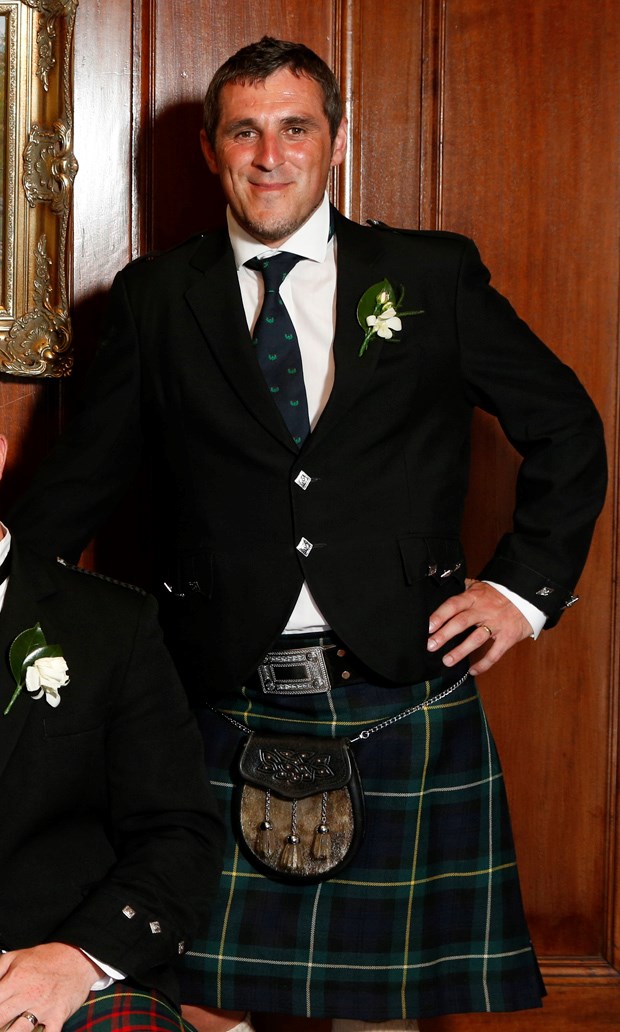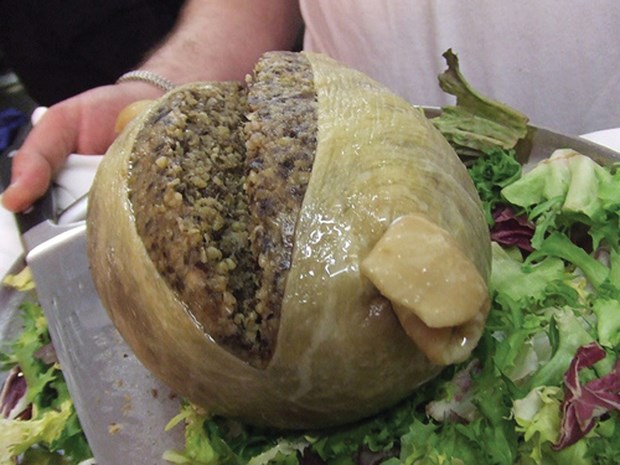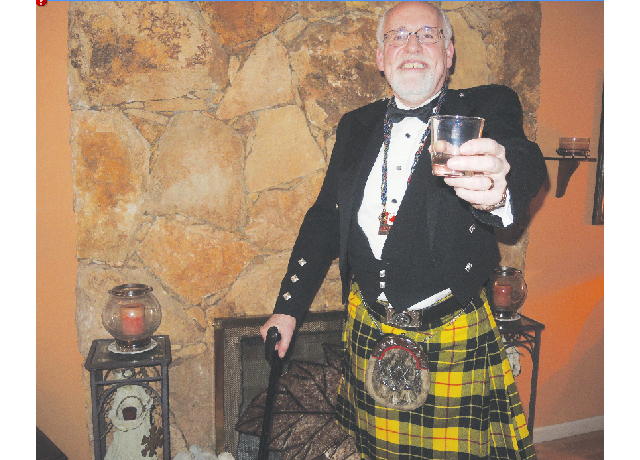Sitting at his kitchen table in Ironwood, Richmond, bedecked from head-to-toe in his clan's tartan, every inch of Ian MacLeod reeks of Scotland.
Grey-bearded MacLeod very much has the "look" of a Highlander and, with his family originating from rugged and remote Western Isles, he's more than entitled to adorn the national dress of Scotland.
He's twice attended the Clan MacLeod's world gathering on the Isle of Skye, held every four years, in 1998 and 2006 and speaks fondly of his deep Gaelic and Cape Breton roots, harking back to how his parents, both of Scots blood, met in Trinidad and Tobago.
And, like every true Scot, the retired lawyer has eaten haggis (of free will) and boasts a secret stash of malt whisky behind the tins of soup in the kitchen cupboard.
Over this weekend, however, and the rest of January, MacLeod will likely get "kilted" out more than once to mark the Jan. 25 birthday of Scotland's most famous son - poet Robert Burns.
"I've done it three times; once at the Clan's luncheon and twice before that at my mum's retirement home," MacLeod, past national president of the Clan MacLeod Society of Canada, said of the "Address to the Haggis," the traditional kick off to any Robbie Burns supper.
"And I'm scheduled to do it again this week (at the Clan MacLeod Society of Greater Vancouver's Burns luncheon in Richmond).
"It's a lot of fun. I cleaned it up a little in terms of the English, because a lot of people might not understand it otherwise." Many Burns purists might not like the idea of the Scots tongue being converted to "proper English," but language, said 64-yearold MacLeod, is "for communicating and I want to make Burns as accessible to as many people as possible." The "Toast to the Lassies" - which arrives near the end of a Burns supper and usually when the audience has done justice to a few bottles of whisky - is "very different" according to MacLeod, who's had the pleasure of delivering the toast four times at various Burns events.
"You can improvise with that a lot more and be as funny as you think you can get away with!" he said.
MacLeod first got involved with the clan society while living in Victoria in 1984 and, after moving to Richmond in 1987, joined the Vancouver society.
"I've been to every clan supper for the last 24 years and the camaraderie is incredible."
MacLeod said the local society, like many traditional organizations, struggles to attract youth into the fold and, as such, invites young fiddlers and Highland dancers to entertain the 100-strong Burns luncheon crowd at the Clan MacLeod Society of Vancouver's annual Burns Luncheon is being held this Sunday, Jan. 19 at the Richmond Curling Club.
"There are some kids and grandkids there at the event," said MacLeod. "But I think that's the same with many traditional societies like us around the world."
Rubbishing suggestions that it's the haggis that's scaring the younger generation away from Robert Burns events, MacLeod paused when asked if he'll eat the national dish this year.
"Haggis is no different than sausage; it's just all the leftover bits, but I only eat it on Robbie Burns Day, though," smiled MacLeod.
Steveston Community Centre will also host a Robbie Burns dinner Thursday, Jan. 23, from 5:30-10 p.m.
Canadians more Scottish than Scots

Canadians more Scottish than Scots
Up until attending my brother's wedding in Australia on this very day last year, I'd never worn a kilt, never eaten haggis in its true form and rarely partaken of Scotland's national drink, whisky.
Suffice to say, I was a poor excuse for a Scotsman and, given my track record on national traditions, I hadn't darkened the door of a Robert Burns supper -apart from being forced to do so as a Primary 7 pupil (Grade 6 student) - until I immigrated to Canada six years ago.
Now, every year, if I'm not at a Burns supper, I have friends around at my house to mark the birth of the famous poet on Jan. 25.
Before I took the leap across the Atlantic, however, I'm sorry to say that date now comes and goes in much of the old country with little more than a tip of a cap at best from the majority of the five million population.
The apathy is nothing a national holiday (yes, Robert Burns Day is not recognized as a day off) wouldn't cure, of course, and maybe that's up the sleeve of the Scottish National Party, should it succeed in this year's big independence referendum.
Just this week, a friend of my wife from back home was bemoaning on Facebook having to listen to her sons reciting Burns poetry as part of their homework for a project on the famous bard.
Heck, the actual birthplace of Scotland's most famous person, Alloway, and a national heritage centre in his memory to match, are a mere 15 miles from my home town in Scotland.
Maybe Scots have just gotten too used to listening to Burns poetry and may be getting a little tired of the stereotype of bagpipes, tartan and haggis? Maybe my generation was "traumatized" by the aforementioned practice of being forced, on pain of death, to attend a Burns supper in our youth?
It didn't help that the main dish at a Burns supper plays to the theory that most of Scottish cuisine is based on a dare.
It is strange, however, that the rest of the world seems to celebrate the memory of a philandering taxman son of a farmer, who was blessed with an uncanny gift of the gab
with women and a latent talent with the quill.
After all, the only nonreligious figures with more statues erected around the globe than Burns are Queen Victoria and Christopher Columbus.
And the work of Burns has influenced many a great human being, such as musician Bob Dylan, U.S. president Abraham Lincoln and author John Steinbeck.
Yet many a Scot, including myself, would hesitate if asked to recall what century Burns even lived his short, but colourful, 37 years (18th century, in case you thought I didn't know).
It's said that Scots croon louder about how much they love their homeland, the further they get away from it.
But I'm glad I moved to Canada to be surrounded by people who celebrate the most famous Scot more than the Scottish.
And I'm happy I finally plucked up the courage to wear the national dress and now enjoy the odd dram on special occasions.
Haggis? That's for the tourists and the English.




